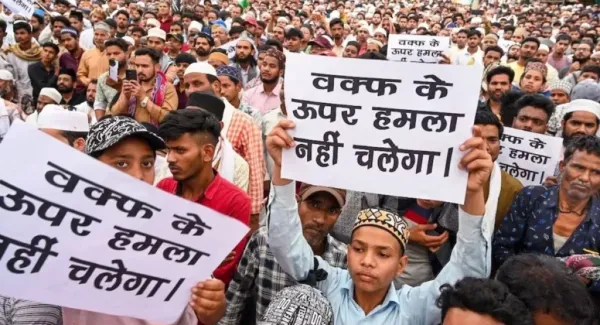
Supreme Court on Monday Waqf Amendment Act The interim verdict on the matter to. The court refused to ban the Act, but some sections definitely stayed. Chief Justice B.R. Gawai and Justice A.G. The bench of Christ said that any law passed by Parliament gets constitutional recognition, but interim security is necessary on some provisions.
After the decision, Muslim organizations described it as their big win. Maulana Arshad Madni of Jamiat Ulama-e-Hind to All India Muslim Personal Law Board and other leaders were welcomed. But as soon as a 128 -page judgment surfaced, the picture changed and the morning happiness turned into despair by evening.
The Muslim parties initially considered the parts recited in the courtroom as the last. They felt that Waqf Amendment Act Many streams have been banned. Congratulations started on this basis. But after reading the complete judgment, it was clear that the court did not stop important issues like ASI survey and ownership transfer.
Muslim side lawyer MR Shamshad said that there is no restriction on the ASI survey being conducted to declare Waqf properties as non-confirmation. This can cause a big crisis about the ownership of religious properties. Shamshad says that this situation can affect the rights of Article 25 and 26.
Waqf Amendment Act There was a provision that the Limitation Act would not be applicable. This meant that they could be protected even in case of possession of Waqf properties. But the Supreme Court stayed this provision and said that the Limitation Act will be implemented. The Muslim side believes that this will benefit the encroachers and the safety of Waqf properties will be in danger.
Even after the decision, the collector’s rights remain intact. This provision is considered disputed. Asaduddin Owaisi said that in this situation government intervention on Waqf properties will increase.
Owaisi called the Supreme Court’s decision incomplete. He said that non-Muslim appointments in the Waqf Board are against religious freedom. He says that if a non-Sikh is made a member of SGPC, then how will the Sikh community feel. Similarly, appointing non-Muslim members in the Waqf Board is a violation of Article 26.
Owaisi also said that a person of any religion has the right to donate property to any other religion. Then why are Muslims being deprived of this right? He sought a clear answer from the government on this.
All India Muslim Personal Law Board said that Waqf Amendment Act But the interim order of the Supreme Court may fail to protect Waqf properties. He says that from the language of the decision, it appears that Waqf institutions have occupied government lands, while reality is the opposite.
Congress MP Imran Pratapgarhi and other leaders also gave mixed reactions to the verdict. While it was considered relief in the morning, there was disappointment by evening.
This order of the Supreme Court is only interim. It will take time for the final decision to come. But at the moment Waqf Amendment Act The confusion that has been created on the provisions to it has worried Muslim organizations and political parties.
This case is not only of religious institutions, but also of social and cultural rights. The final decision of the court will have a decisive impact on Waqf properties and their safety across the country.
Waqf Amendment Act But the interim order of the Supreme Court has brought both relief and anxiety. On the one hand, the ban on some provisions gives satisfaction to Muslim organizations, while the decision on issues like ASI Survey and Limitation Act has created a sense of insecurity. Now everyone’s eyes are on the final decision of the Supreme Court, which will determine the direction of Waqf properties and the rights of religious freedom.